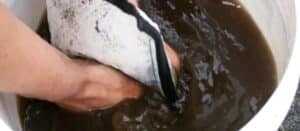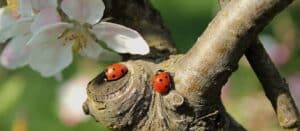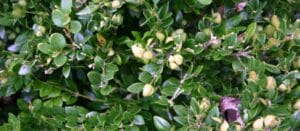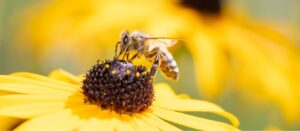As the summer heat continues into August, many lawns in New Jersey and eastern Pennsylvania are showing signs of heat and drought stress (and associated insect damage). We notice that homeowners often water their lawns incorrectly in summer. Rather than helping their turfgrass stay green and vigorous until cooler temperatures arrive in fall, they make lawn problems worse with improper watering.
In this article, we explain:
- the right way to water your lawn in summer,
- how improper summer watering damages your lawn (and how to recognize it), and
- how to help your lawn recover from summer damage caused by too much or too little water.
Watering Your Lawn in Summer
Keeping your lawn irrigated the right way during summer’s hot weather is the best way to keep it healthy. Proper watering prevents:
- water stress,
- insect damage, and
- turf diseases.
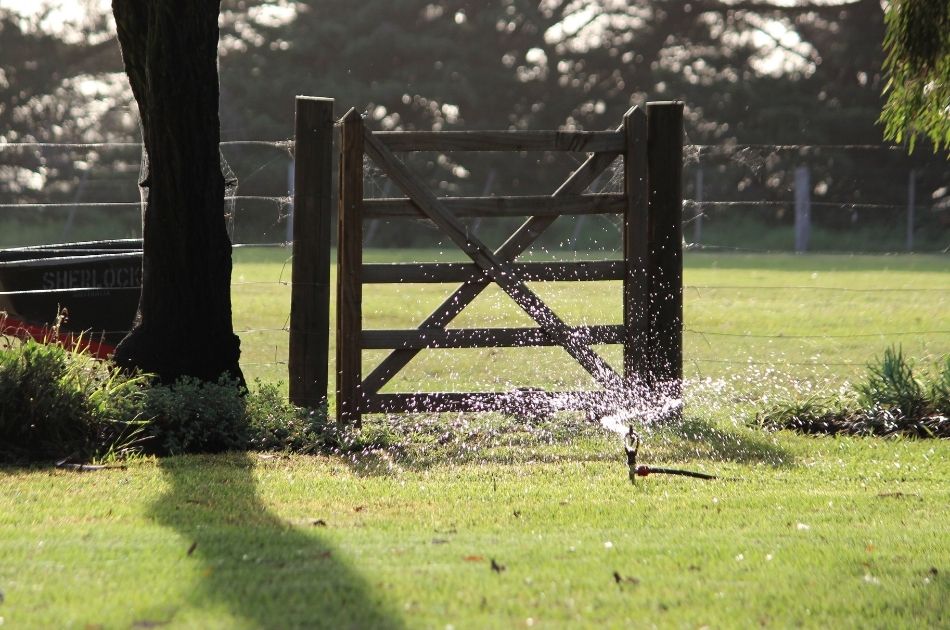
When to Water Your Lawn
Water in Early Morning
The best time to water your lawn is early in the morning before temperatures rise. Watering early helps ensure that your turfgrass is already hydrated by the time the sun starts beating down. Early watering will help your lawn withstand the day’s heat without wilting or drying out.
Another good reason to water early in the morning is that any excess water on your grass blades will evaporate during the day. If you water in the evening, this excess water will remain on your grass and on the soil surface, creating conditions for fungal diseases to grow.
Why You Shouldn’t Water After Sundown
All plants, including turfgrass, photosynthesize when the sun is out. Daylight hours are when they take up water through their roots and expel it from the tiny pores, or stomata, on their leaf surfaces.
When the sun goes down, plants stop photosynthesizing, these pores close, and much of your irrigation water will drain away through the soil instead of being used by your turfgrasses’ roots.
Don’t Irrigate If It’s Raining!
During summer rains, be sure to turn off your irrigation system. Rains supply natural irrigation for your lawn, so it won’t need more watering. And overwatering in summer is one very common lawn mistake.
Summer Lawn Watering Mistakes
If you have difficulty keeping your lawn green and healthy in the summer, it may be because you’re not watering it right. Here are some common lawn problems related to watering mistakes, and the reasons behind them.
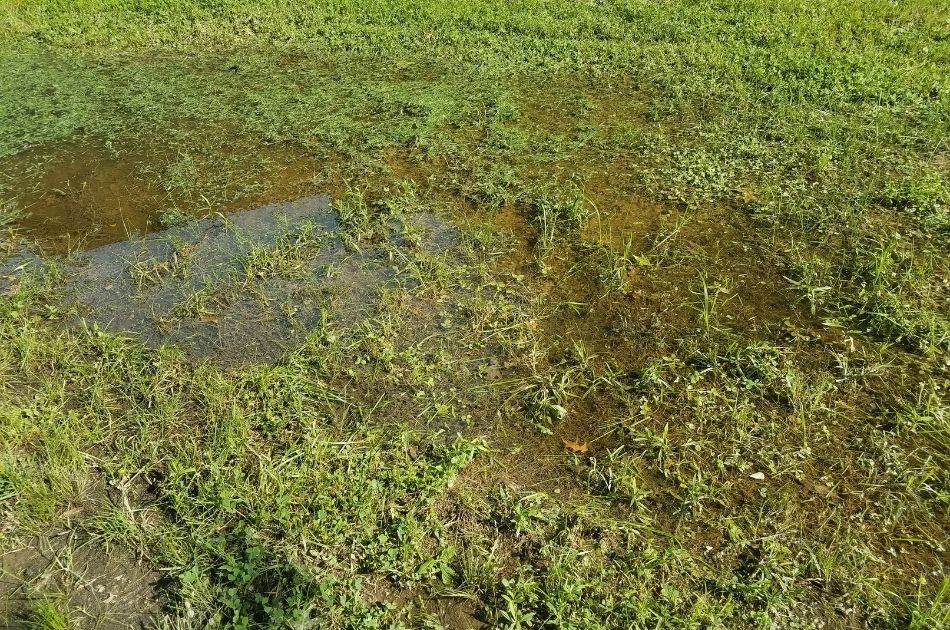
Mistake #1 – Your Lawn is Turning Brown
If you see your green lawn turning brown, it could be due to one of two common reasons.
- Water stress – Turfgrasses have shallow root systems (about 4” deep), so it doesn’t take long for the soil around their roots to dry out.
- Summer dormancy – This is a common plant stress response to drought and high temperatures.
The good news is that by adjusting your watering schedule, not mowing your grass too short, and choosing a turfgrass mix designed to withstand high heat, you can keep your grass green all summer.
A brown, water-stressed lawn will usually produce new, green growth when it gets enough irrigation.
>> Learn more about the best lawn grasses for New Jersey and Pennsylvania
Mistake #2 – Your Lawn is Turning Yellow or Wilting
Too much irrigation can stress your lawn the same way too little watering can.
Overwatering “suffocates” your turfgrasses’ roots by saturating the soil and filling the soil spaces (pores) that would otherwise provide oxygen to your lawn.
Follow these steps to fix an overwatered lawn –
- Reduce how much water you give your lawn
- Reduce the frequency with which you irrigate
- Make sure your irrigation system isn’t running during summer rainstorms.
If you don’t see improvement after changing your irrigation schedule, your lawn may need aerating. Core aeration this fall will improve water drainage and prevent waterlogged soil.
PRO TIP – Lawn aeration can also help with drought stress, as compacted soil and thatch buildup can prevent irrigation water from reaching roots. If your soil is compacted or thatch buildup is choking your lawn, irrigation water will run off instead of soaking into your soil.
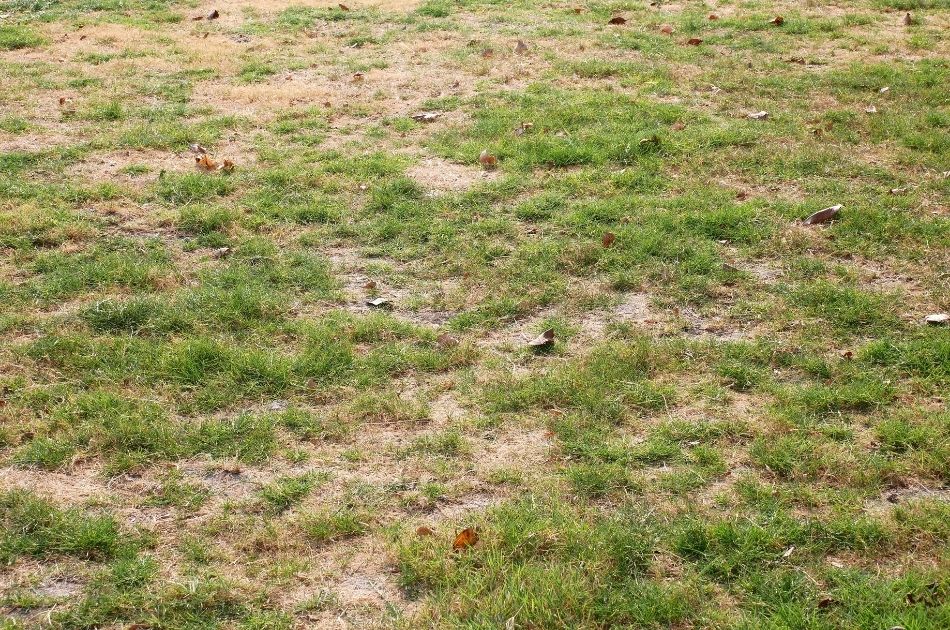
Mistake #3 – Your Lawn Has Dead, Dying, or Discolored Patches
If your lawn is mostly green but has areas of red, brown, or dead grass, or round spots of yellow grass, you may have a pest problem or a fungal disease. Humid weather and high temperatures combined with irrigation create an ideal setting for fungal diseases to flourish.
In central New Jersey and eastern Pennsylvania, some of the common lawn pests we see include:
To help prevent fungal problems, consider applying a lawn fungicide. Adjusting your irrigation cycles will also help prevent the spread of fungal growth. And gentle fertilizing will encourage healthy new grass to grow when temperatures moderate in fall.
Fixing Summer Lawn Watering Damage
There are several things you can do to repair (and prevent) lawn damage from summer watering mistakes.
Check Your Irrigation System
If you have a lawn irrigation system, make sure its watering cycles are set to deliver the right amount of water. Too little, and your lawn will dry out and turn brown; too much and you’re creating an ideal environment for insects and diseases.
Newer “smart” irrigation systems often include a temperature sensor and a soil moisture meter that adjust watering cycles in response to existing weather conditions. This means that if it’s recently rained or the weather is cool (and your soil is already wet), your irrigation system won’t keep watering when it’s not needed.
Avoid Over Fertilizing a Stressed Lawn
When your summer lawn is stressed, it needs time to recover. First, identify the cause of your summer lawn problems (such as watering too much or too little). Then let your turfgrass grow healthy new blades at its own pace.
While gentle fertilizing helps your lawn, applying too much fertilizer can further stress a lawn that’s struggling. Nitrogen fertilizer tells grass to push out new growth, fast. If your lawn is recovering from water stress, it may not have enough energy to handle accelerated growth.
And don’t forget that even if your lawn is healthy, excess fertilizer will add salts to your soil and can create damaging nitrogen runoff.
>> Learn more about how the fertilizer law in New Jersey affects you and your lawns
> Learn more about using compost tea to help stressed lawns
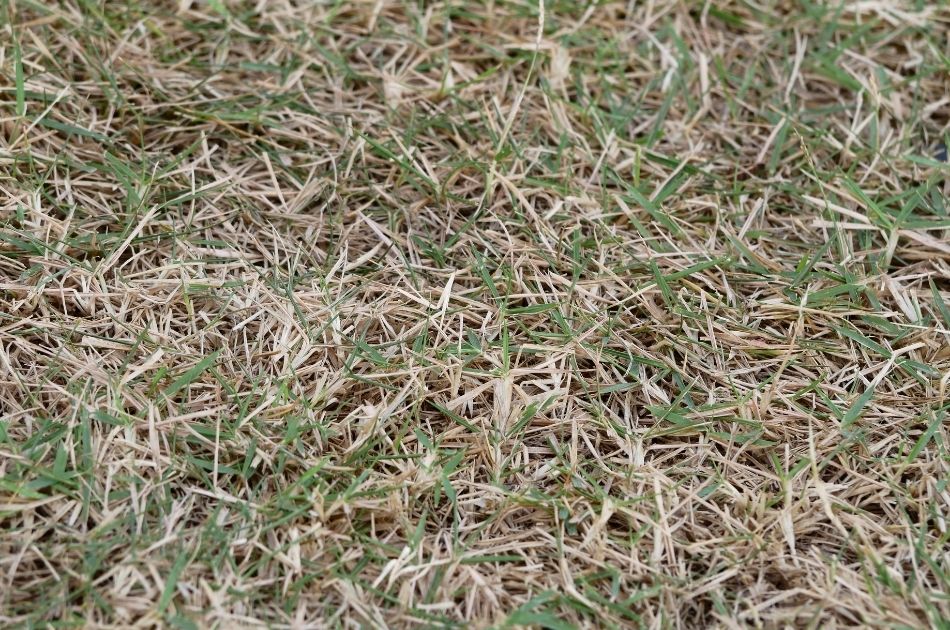
Don’t Overseed Your Lawn in Summer
While you might think it’s a good idea to help a patchy lawn grow fuller by overseeding, don’t do it now. When new grass blades start growing, they have tiny root systems. Temperature spikes and even brief periods of insufficient water will quickly kill these little sprouts.
Wait until fall’s cooler weather to overseed your lawn so new grass blades have time to establish themselves. That way, you’ll see a thicker, greener lawn next spring.
>> Ask us about getting on the schedule for our Lawn Overseeding Program
Don’t Over Mow Your Recovering Lawn
A neatly mown lawn may look nice, but over-mowing will further stress your turfgrass.
Mowing the grass too short and too often reduces the amount of grass that can photosynthesize and produce food energy.
This slows your lawn’s growth rate, as well as its ability to recover from watering mistakes.
Over mowing also increases the chance of drought stress. Cutting down longer grass blades that shade the roots means your soil will lose moisture faster.
And if these reasons aren’t enough, don’t forget that an over-mown lawn lets more sunlight reach the soil’s surface, which encourages weed seeds to germinate!
So let your lawn grow a little taller while it recovers from too little or too much summer watering, and you’ll see it return to its beautiful green state faster.
>> Learn about five simple mowing practices that will give you a healthier lawn
We’re Here to Help
If your lawn isn’t looking as good as it should, or has dead, bare, or discolored areas, we recommend fall aeration and overseeding. Here in New Jersey and Pennsylvania, we usually do lawn aeration in September through October (depending on weather conditions). That makes August a good time to learn more about core aeration for lawns and how overseeding in fall will give you a lush green lawn in spring. Then give us a call to get on our fall lawncare schedule!
GET THE LATEST NEWS
Subscribe to the Organic Plant Care Newsletter and get timely and helpful tips and updates monthly.
There's no spam - we promise!

